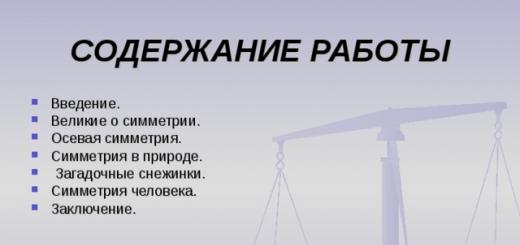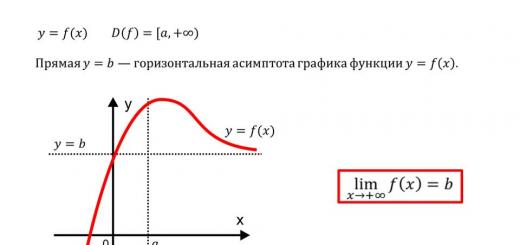In modern Russian there are two main types of one-part sentences - verbal and nominal. In verbal one-part sentences, an independent attribute (action) is asserted: They sang in the garden; You'll have to wait; To be a great thunderstorm, etc. In nominal (substantive) one-part sentences, the existence of an object is affirmed or denied: Midnight; It's winter again; It's not summer; Snow!; Not a tree around, etc.
The independent positions of the main member in verbal and nominal one-part sentences differ significantly. Verb forms, by their morphological nature, gravitate towards a dependent position, towards the expression of a characteristic attributed to the subject. Therefore, placing them in an independent position requires special constructive conditions: the structure of the sentence itself determines the independent position of the verb form. Thus, the word form slept, taken separately, seems to be dependent and, as it were, predetermines agreement with the dominant (nominal) form, however, in the construction “They were already sleeping in the house,” this form occupies an independent position. The independent position of a nominal form is determined either by direct case (nominative) or by the absence of a subordinating word in the sentence structure (independent genitive).
Observations by linguists show that in verbal one-part sentences, all basic conjugated forms and the infinitive can act as the main member. In nominal sentences, only a noun (or a substantivized word) in the nominative or genitive case is used in the position of the main member.
The main member in verbal sentences, with its morphological forms, expresses the most important grammatical categories of modality, temporality, and personality. In nominal one-part sentences there is no possibility of direct morphological expression of predicative categories, and they are revealed with the help of constructive and intonation indicators, that is, by purely syntactic means.
According to experts, the common property of all verbal one-part sentences is lack of subjectivity. The correlation between the subject and the attribute is not presented; the action indicated in the main member is formalized as independent (cf.: Everyone in the house was already asleep - They were already sleeping in the house). However, independent action is internally related to the agent. Thus, in the sentence “They were already sleeping in the house,” the verb expresses an action that is thought of as being performed by the agent (and not performed by itself), but the agent is not verbally designated, but grammatically, in the form of the verbal main member, is presented as indefinite.
|
II. Subject – quantitative-nominal combination (counting turnover): Two lamps, a thousand volts and so on. |
|
|
Predicate in singular form. |
Predicate in plural form. |
|
1) The subject comes after the predicate, especially if the sentence is not extended: WasO madeO (units) eight reports. | |
|
2) Subject – quantitative combination with words: pair, three, ten, dozen, hundred, thousand, million, billion: WasA carried outA (units) a thousand experiences. |
3) Subject - quantitative combination with numerals 2,3,4: WasAnd carried outs (plural) four experiences. |
|
4) Subject - quantitative combination with a word one : Three hundred and twentyone copy textbook on philosophy entered ( units ) to the library. | |
|
5) Subject - quantitative combination with words one and a half, one and a half:WasO writtenO (units) one and a half pages of abstracts | |
|
6) Subject - quantitative combination with words as much as, a lot, a little, little, a lot:HappenedO (units) a lot of events. |
7) Subject - quantitative combination with numeral both (both):Both tasks completeds (plural). |
|
8) The subject of a quantitative combination contains words just, only, only:SolvedO (units) just five examples. |
9) The subject of a quantitative combination contains: a) agreed upon pronoun in plural (these, all and so on .) : Mades (plural) All seven tasks; b) another specific definition ( adjective, participle, participial phrase, attributive clause with the word which): Two required quantities founds (plural). |
|
10) The subject means: a) time period: Twenty minutes expiredO (units); b) weight measure: B wasO usedO (units) two kilograms of the substance; c) measure of space: Eight hectares of field not yet sownO (units). | |
|
11) Subject - quantitative combination with the meaning of approximate: On the ground aliveno (units) more than three billion people. | |
|
12) Subject quantitative combination, the components of which are separated: Students cameO (units) two. | |
|
13) Subject - combination for someone/something: In the last experiment in a test tube with food placedO s(units) two Drosophila flies. | |
Task 19
Read the sentences. Using the material in Table 3, explain the author’s choice of form for the number of selected predicates.
1) Since the advent of the personal computer on the mass market passed approximately twenty-five years.
2) The expedition reached Kamchatka - Nizhnekamchatsk with enormous hardships, having lost more than 500 horses, part of the cargo, and went hungry. Died from deprivation of several dozen people, was many sick and fled.
3) A thousand-year-old “telephone” was found in the ruins of a palace in Peru. These are two pumpkin vessels connected by a tightly stretched string. Since then across the Atlantic Ocean paved more than two dozen telegraph cables.
4)Electricity at that time was two - one that Thales knew, the one that the burgomaster Otto von Guericke received on huge balls of sulfur, the one that Franklin knew, the one that is responsible for the attraction of pieces of paper and fluff, static electricity. The other was Voltaic galvanic electricity, with the help of which it was possible to decompose water and acids, which was obtained using Voltaic columns.
5) Maxwell is probably the only person in the history of science, in whose honor available so many names. These are “Maxwell’s equation”, “Maxwell’s electrodynamics”, “Maxwell’s rule”, “Maxwell’s current” and, finally, maxwell - the unit of magnetic flux in the CGS system.
6) Robert Wood showed a few more experiments, and saved the big box for the end of the lecture. If he pointed it upward, an invisible ring of air would strike the auditorium dome and extinguish most of the gas chandelier that hung below the ceiling. Two or three of them though didn't go out and from them the light again spread throughout the entire circle of the chandelier, so that the experiment could be repeated again and again - as quickly as the blows on the box allowed.
7) Research acquired a particularly wide scope in the summer of 1753. The annual public meeting of the Academy of Sciences was scheduled for September 6th of that year, at which both scientists (Lomonosov and Richman) were supposed to perform with reports on atmospheric electricity.
8) Two prominent figures of Peter the Great’s time, Tatishchev and Neplyuev, have taken take the matter raised by him into his own hands, and distributed Russian state power to a new, alien, rich land.
9) Seven hundred and fifty-one participants in the pedagogical experiment demonstrated good knowledge of the material.
10) When modeling the system was considered two options for operating the feedwater supply circuit.
11) An hour and a half lecture by the inventor of wireless telegraphy Marconi passed awaiting the demonstration of transatlantic signals from Glace Bay in Nova Scotia (in America).
12) When writing an abstract used only three articles.
13)In the laboratory on the right and left stood two cabinets each
Task 20
Table 4
A nominal (substantive) one-part sentence is constructed without verb forms. The main member is expressed by a noun in the nominative case; for example: Hurray! They laugh. Well done actors. Luck! Success! (Bulg.). Therefore, they are called nominative (from the Latin name for the nominative case) or denominative.
The main member names an object to which an action, state or attribute is not attributed in the sentence, but expresses the meaning of the presence, the existence of the object - the existential meaning. The main member can also be expressed by an indivisible phrase in the nominative case; for example: Look how good we are. Two wonderful rooms! (B.). The existential meaning is combined with the meaning of the present tense, which is expressed by the significant absence of the verb, i.e., “syntactic zero”; Wed: There was darkness and lights ahead (B.). Here the existential meaning is expressed by the verb.
To the general existential meaning of a nominative sentence, one or another shade can be added, expressed by particles:
1) index: here, there; for example: Here is a willow (P.);
2) achievement: here it is; for example: Here comes the forest (T.); It’s already September (Ch.);
3) emotional: what for, like this, what, well, this, etc.; for example: Christmas time has come. What a joy! (P.).
As part of a sentence, secondary members can be used, connected to the main one by the method of coordination or control; for example: What a quiet night! The silence of the great city (A.T.).
Modern Russian literary language / Ed. P. A. Lekanta - M., 2009
The contrast between two-part and one-part sentences is associated with the number of members included in the grammatical basis.
Two-Part Sentences contain two The main members are the subject and the predicate.
The boy is running; The earth is round.
One-part sentences contain one main member (subject or predicate).
Evening; It's getting dark.
Types of one-part sentences
| Principal term expression form | Examples | Correlative constructions two-part sentences |
|---|---|---|
| 1. Sentences with one main member - PREDICATE | ||
| 1.1. Definitely personal proposals | ||
| Predicate verb in the 1st or 2nd person form (there are no past tense or conditional forms, since in these forms the verb has no person). |
I love the storm in early May. |
I I love the storm in early May. |
| 1.2. Vaguely personal proposals | ||
| Verb-predicate in the third person plural form (in the past tense and conditional mood, verb-predicate in the plural). |
They knock on the door. |
Somebody knocks on the door. |
| 1.3. Generalized personal proposals | ||
| They do not have their own specific form of expression. In form - definitely personal or indefinitely personal. Isolated by value. Two main types of value: A) the action can be attributed to any person; B) the action of a specific person (speaker) is habitual, repetitive, or presented in the form of a generalized judgment (the predicate verb is in the 2nd person singular, although we are talking about the speaker, that is, the 1st person). |
You can't take the fish out of the pond without difficulty(definitely personal in form). |
Any ( any) can’t easily take the fish out of the pond. |
| 1.4. Impersonal offer | ||
| 1) Predicate verb in impersonal form (coincides with the singular, third person or neuter form). |
A) It's getting light; It was getting light; I'm lucky; |
b) Snow is melting; |
| 2) A compound nominal predicate with a nominal part - an adverb. |
A) It's cold outside ; |
a) there are no correlative structures; b) I'm cold; |
| 3) A compound verbal predicate, the auxiliary part of which is a compound nominal predicate with a nominal part - an adverb. |
A) To me sorry to leave with you; |
A) I I don't want to leave with you; |
| 4) A compound nominal predicate with a nominal part - a short passive participle of the past tense in the singular form, neuter. |
Closed . |
The shop is closed . |
| 5) The predicate no or a verb in an impersonal form with a negative particle not + an object in the genitive case (negative impersonal sentences). |
No money . |
|
| 6) The predicate no or a verb in the impersonal form with a negative particle not + an object in the genitive case with an intensifying particle neither (negative impersonal sentences). |
There is not a cloud in the sky. |
The sky is cloudless. |
| 1.5. Infinitive sentences | ||
| The predicate is an independent infinitive. |
Everyone keep quiet! |
Everyone keep quiet. |
| 2. Sentences with one main member - SUBJECT | ||
| Nominative (nominative) sentences | ||
| The subject is a name in the nominative case (there cannot be a circumstance or addition in the sentence that would relate to the predicate). |
Night . |
Usually there are no correlative structures. |
Notes
1) Negative impersonal sentences ( No money; There's not a cloud in the sky) are monocomponent only when expressing negation. If the construction is made affirmative, the sentence will become two-part: the genitive case form will change to the nominative case form (cf.: No money. - Have money ; There is not a cloud in the sky. - There are clouds in the sky).
2) A number of researchers form the genitive case in negative impersonal sentences ( No money ; There's not a cloud in the sky) is considered part of the predicate. In school textbooks, this form is usually treated as an addition.
3) Infinitive sentences ( Be silent! Be a thunderstorm!) a number of researchers classify them as impersonal. They are also discussed in the school textbook. But infinitive sentences differ from impersonal sentences in meaning. The main part of impersonal sentences denotes an action that arises and proceeds independently of the actor. In infinitive sentences the person is encouraged to take active action ( Be silent!); the inevitability or desirability of active action is noted ( Be a thunderstorm! Let's go to the sea!).
4) Many researchers classify denominative (nominative) sentences as two-part sentences with a zero connective.
Note!
1) In negative impersonal sentences with an object in the form of the genitive case with an intensifying particle neither ( There is not a cloud in the sky; I don't have a penny) the predicate is often omitted (cf.: The sky is clear; I don't have a penny).
In this case, we can talk about a one-part and at the same time incomplete sentence (with an omitted predicate).
2) The main meaning of denominative (nominative) sentences ( Night) is a statement of being (presence, existence) of objects and phenomena. These constructions are possible only when the phenomenon is correlated with the present time. When changing tense or mood, the sentence becomes two-part with the predicate be.
Wed: It was night ; It will be night; Let there be night; It would be night.
3) Denominative (nominative) sentences cannot contain adverbials, since this minor member usually correlates with the predicate (and there is no predicate in denominative (nominative) sentences). If a sentence contains a subject and a circumstance ( Pharmacy- (Where?) around the corner; I- (Where?) to the window), then it is more expedient to parse such sentences as two-part incomplete ones - with the predicate omitted.
Wed: The pharmacy is / is located around the corner; I rushed / ran to the window.
4) Denominative (nominative) sentences cannot contain additions that are correlated with the predicate. If there are such additions in the sentence ( I- (for whom?) For you), then it is more expedient to parse these sentences as two-part incomplete ones - with the predicate omitted.Wed: I'm walking/following you.
Plan for parsing a one-part sentence
- Determine the type of one-part sentence.
- Indicate those grammatical features of the main member that allow the sentence to be classified specifically as this type of one-part sentence.
Sample parsing
Show off, city of Petrov(Pushkin).
The sentence is one-part (definitely personal). Predicate show off expressed by a verb in the second person imperative mood.
A fire was lit in the kitchen(Sholokhov).
The sentence is one-part (indefinitely personal). Predicate lit expressed by a verb in the plural past tense.
With a kind word you can melt a stone(proverb).
The proposal is one-part. The form is definitely personal: predicate melt it expressed by a verb in the second person future tense; in meaning - generalized-personal: the action of the predicate verb refers to any character (cf.: A kind word will melt any stone).
It smelled wonderful of fish.(Kuprin).
The sentence is one-part (impersonal). Predicate smelled expressed by a verb in an impersonal form (past tense, singular, neuter).
Soft moonlight(Zastozhny).
The sentence is one-part (nominal). Main member - subject light- expressed by a noun in the nominative case.
> One-part sentencesOne-part sentences- sentences, the grammatical basis of which is represented by one main member (subject or predicate).
One-part sentences
One-part verb sentences
1. B definitely personal proposals an action called a simple or compound predicate correlates with a specific person not expressed verbally in the sentence.
verb in the 1st or 2nd person indicative mood ( I remember bright moonlit night(Kataev). I'm falling into a strange oblivion(Kataev). I won't continue an inventory of these masquerade impressions(Nabokov). Danilo Kupora You know? (L.N. Tolstoy). Very I'll be glad, if it will be for you too(L.N. Tolstoy);
Don't drive me!(Ostrovsky). Second Lieutenant Romashov, order play something for your ears(Kuprin)).
2. B vaguely personal sentences the character is thought of as vague, unknown, or unimportant for the message.
Ways of expressing a simple verbal predicate or an auxiliary part of a compound predicate can be as follows:
verb in the 3rd person plural form of the present or future indicative mood ( Nowhere do not know how so much spend money like in Odessa(Averchenko));
verb in the plural form of the past tense of the indicative mood ( For the time being, old Moscow, its central part didn't touch (Kataev). In Moscow it met very cordially(Shalamov). His called to the commandant(Kataev). Horses tied up for a stand(Kataev));
verb in the plural form of the subjunctive mood ( If only knew what do you want, a holiday would be canceled (L.N. Tolstoy)).
3. B generalized personal sentences The action applies to a wide range of people. Such sentences contain advice, orders, etc., and therefore are often presented in proverbs.
Ways of expressing a simple verbal predicate or an auxiliary part of a compound predicate can be as follows:
verb in the 2nd person singular or plural indicative mood ( Yes, my brother, it’s okay can't help it... (Kuprin). Easily you can't take it out and fish from the pond(proverb). Over your head you won't jump (proverb). Jump up you won't get caught (proverb). You will hold on to each other - you can Nothing Do not be scared (proverb));
imperative verb ( Of two evils choose smaller(proverb));
(sometimes) verb in the 3rd person plural form of the present or future indicative mood ( After a fist fight don't wave (proverb). To a foreign monastery with its own charter don't go (proverb)).
4. B impersonal sentences called an action or state that exists independently of the producer of the action or the bearer of the attribute.
The main member of an impersonal sentence can be represented by a simple verbal predicate, a compound verbal predicate, or a compound nominal predicate.
The main ways to express a simple verbal predicate:
verbs in the form of the neuter indicative mood of the past tense ( At the top of the hill we drenched predawn wind(Korolenko). In London did not have not a single person close to me(Herzen). Furniture in the room was A little(Strugatsky));
verb in the 3rd person singular form of the present or future indicative mood ( It's getting dark , by night a blizzard rises(Bunin). And then again, near the very windows, pine and spruce trees will often be covered in snow, black forests will approach in dense thickets, will darken in the wagon...(Bunin));
impersonal verb, often with negation ( Can't sleep to me, can't sleep... (Turgenev). It's getting light . Here is a glimpse of the village, houses, gardens(Gogol). Pinocchio used his fingers to explain to this fool that it was dark and dangerous now, but when dawn- they will run to the girl(A.N. Tolstoy));
word No(Neither Shura nor me are already in Saransk at this time No (Trifonov)).
The main way of expressing a compound verbal predicate: auxiliary part (personal verb in the form of the indicative mood of the neuter past tense, impersonal verb, state category word) + infinitive ( I had to endure it a lot of fights(Shalamov). To me lucky repeatedly visit in the Dresden gallery(Paustovsky). It was starting to get light (Kuprin). In my laboratory can be removed the most ridiculous sci-fi movie ever(V.P. Aksenov). It is forbidden the same person on the street throwing away (Kataev). However, I had to bitterly be disappointed (Korolenko)).
The main ways of expressing a compound nominal predicate:
linking verb in the 3rd person indicative mood of the past or future tense or zero connective (in the present tense) + short passive participle in the neuter form ( In her eyes, languid, tired, the burden of bliss was written; everything in his room breathed heaven; was so light, so removed (Gogol). In Aristarchus's room smoky ...(Shukshin). She became happy, perked up, got excited and started apologizing that she had not tidy (Kuprin));
linking verb in the form of the 3rd person indicative mood of the past or future tense or zero connective (in the present tense) + word category state ( The best thing was in forests(Paustovsky). From this cold praise of the impressionable Ninotchka got bored (Andreev). At the Maly Theater comfortable, purely, proudly, luxuriously (Olesha). It was dark since morning(Prishvin). In Ksenia Feodorovna's room as before it was quiet (Trifonov)).
5. B infinitives proposals The action is called desirable, possible/impossible, necessary, etc. The main member is the predicate, expressed by the independent infinitive ( Deep above the shore of Sevan dig tunnel by lowering a vertical shaft into it from the surface of the earth(Kataev). - Where would fish take? - he said, looking around and patting his pockets. - A fish...(Strugatsky). So the hunters finally made an agreement: this hare don't kill, A fire by(Kuprin)).
One-part nominal sentences
Nominative (nominative, substantive, nominative) sentences have a general meaning of being the subject of speech ( Early Moscow evening, winter, warm(Shalamov). And here is the lane connecting Tverskaya with Nikitskaya(Olesha). Golden night!(Leskov). Silence, light, aroma and beneficial, revitalizing warmth(Leskov). What a wonderful land!(Goncharov). - Ah, here she is! - he shouted laughing(Tolstoy)).
The main ways of expressing the main member - the subject - are a noun, a pronoun, and a noun phrase.
generated in 0.023742914199829 sec.










